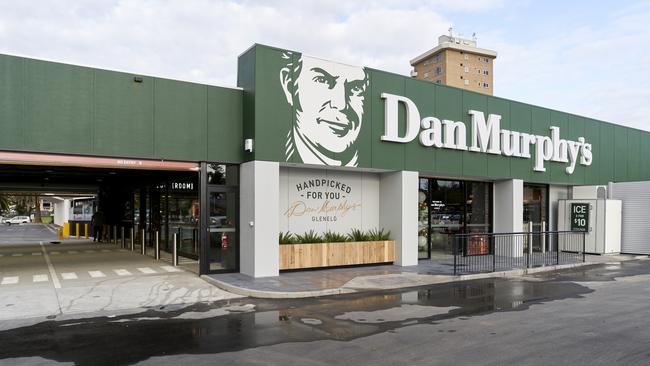Cost of living pressures are forcing drinkers to opt for cheaper beverages and value
Drinkers are opting for cheaper, value-orientated choices when walking the aisles of Dan Murphy’s or BWS, says liquor and pubs giant Endeavour.
Drinkers are turning to cheaper and more value-orientated beverage options when they head into a Dan Murphy’s, BWS or their local pub, as cost of living pressures force many households to skimp on the good stuff.
Endeavour Group, the owner of bottle shops Dan Murphy’s and BWS and the largest network of hotels and pubs in Australia on Monday released its third quarter sales performance, which showed the strains of cost of living pressures, mirroring a similarly downbeat analysis of consumers delivered by Coles last week.
Endeavour has reported tougher trading conditions since the start of the year as consumers opt for cheaper and more value-orientated drinks options, with those subdued conditions spilling into the fourth quarter.
The company, which was spun off from Woolworths in mid-2021, said retail sales for its bottle shops of $2.4bn was up 2.4 per cent for the quarter. After accounting for the timing of New Year’s Eve and Easter, normalised sales were up just 0.9 per cent.
At its network of more than 350 pubs, sales of $487m were up 1.5 per cent or 1.7 per cent on a normalised basis.
Total sales for the quarter for Endeavour Group were $2.89bn, up 2.2 per cent or 1 per cent on a normalised basis.

Endeavour chief executive Steve Donohue said Endeavour had delivered a stable third quarter trading performance in a softer market, with both retail and hotels growing sales and its brand and customer metrics remaining strong.
“Our unparalleled value proposition continues to make Dan Murphy’s Australia’s leading destination for drinks … our hotels continue to show their resilience in challenging economic conditions, with all drivers in growth during the quarter.
“Our localised food and beverage offer continues to resonate strongly with customers looking to enjoy affordable social experiences with family and friends.”
At its retail arm, on a comparable store basis, sales for BWS and Dan Murphy’s were flat compared to the same period last year. Sales at Easter, which was in week 13 of the quarter, were ahead of the comparable period last year.
After a slow start to the quarter in January, trading conditions improved slightly in February and March, but remained subdued relative to the first half, Endeavour said.
“Customer trends towards value, convenience and discovery continue, with many customers shopping more selectively and prioritising value. The appetite for both convenience and discovery is evident in the pre-mixed category, which again had the highest sales growth in the quarter,” Endeavour said in its ASX statement.
In February at its half-year results Endeavour said its liquor retail sales for the start of calendar 2024 were broadly flat, up 0.3 per cent, reflecting subdued sales in January, followed by an improved start to February, which saw sales growth of 1.5 per cent over the first three weeks.
When Coles reported its quarterly sales last week it revealed similarly tough conditions in the liquor market as shoppers sought out cheaper booze options, traded down to less expensive liquor or slowed down their spending. Coles’ liquor arm, which includes Liquorland, First Choice and Vintage Cellars, recorded a 1.9 per cent fall in liquor sales for the third quarter.
For now it looks like Dan Murphy’s and BWS are outperforming rivals under the Coles banner.
On Monday Endeavour said its MyDan’s membership program added over 175,000 new members during the quarter and achieved a record peak scan rate of 84 per cent from its 5.4 million total active members. Online Retail sales grew by 8.4 per cent.
For its hotels and pubs arm, value options on its menus appealed to customers while accommodation demand was supported by touring events from major international artists including Taylor Swift.
Spending on its more than 12,000 gaming machines returned to modest growth in the quarter, although revenue in Victoria continued to be impacted by early adoption of the Victorian government’s planned changes to trading hours ahead of the wider market.






To join the conversation, please log in. Don't have an account? Register
Join the conversation, you are commenting as Logout